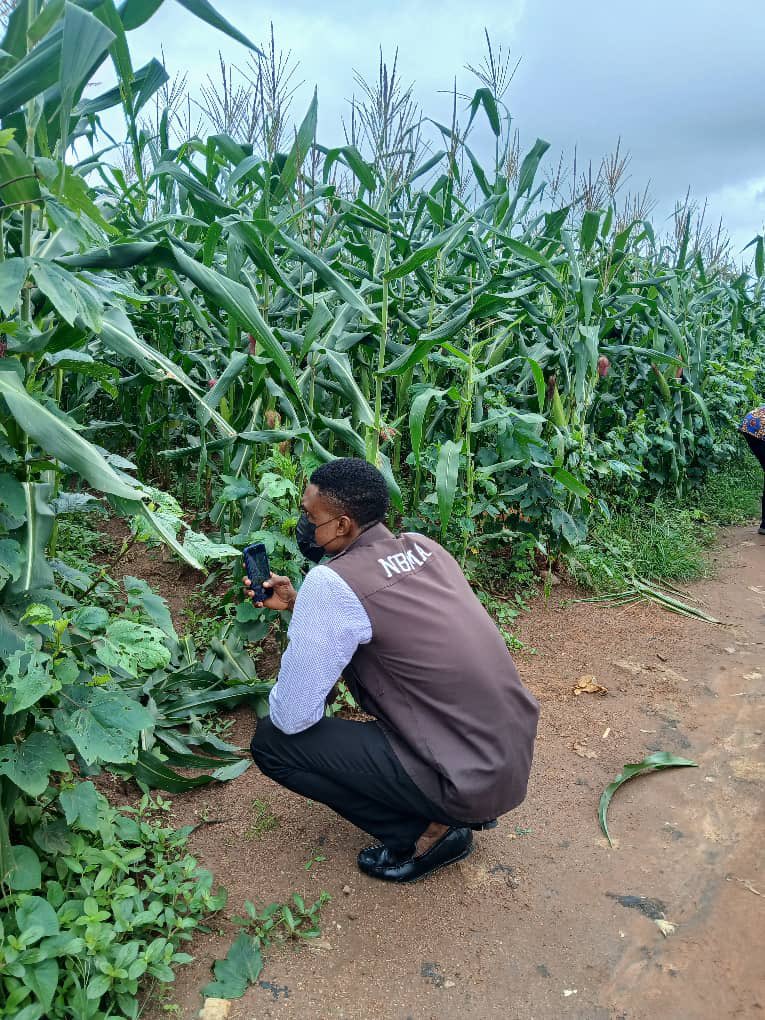The safety of Genetically Modified (GM) crops was once again at the spotlight in Nigeria as representatives representatives from four key federal government agencies have undertaken a fact-finding visit to farms where genetically modified (GM) maize and cowpea are being cultivated in the country.
The “Seeing is Believing” tour on held led by the National Biosafety Management Agency (NBMA), included officials from the National Orientation Agency (NOA), the Federal Competition and Consumer Protection Commission (FCCPC), and the National Biotechnology Research and Development Agency (NBRDA). It was a curious visit to GM farms with the aim of ascertaining the truth or otherwise of the claims and scares about GM crops.
At the various farm sites, the group had the opportunity of dispelling some myths around the improved varieties of the crops.
From a TELA Maize farm in Dei-Dei, a fringe community in the FCT owned by a farmer who took a daring chance to cultivate the crop, to the research farms at NBRDA’s expansive premises in Abuja, the group of officials were led in a guided tour by Dr. Yarama Ndipaya of the African Agricultural Technology Foundation (AATF) who used the occasion to highlight the yield advantage and resilience of genetically modified crops compared to conventional varieties.
“We are struggling to meet the growing demand from farmers for TELA Maize and Pod Borer Resistant (PBR) Cowpea seeds. These improved varieties consistently outperform conventional ones in yield, pest resistance, and adaptability. Farmers themselves are witnessing and affirming their benefits,” Dr. Ndipaya said during the tour on Wednesday.
He emphasised that Genetic Modification technology offers tailored solutions to the specific needs and ecological challenges of African agriculture, saying, “It is our responsibility to ensure smallholder farmers have access to technologies that can boost productivity and secure livelihoods,” he added.
Speaking during the visit, Mr. Andrew Nanfwang, a local farmer, attested to the impact of GM technology on his farming outcomes.
“TELA maize has significantly improved my yields. The difference is clear,” he said.
Mr. Segun Alao, Deputy Director in the Department of Environment, Climate and Energy at the National Orientation Agency said the farm tour was a real eye-opener as most of them on the tour were actually made to almost believe all the negative stories about GM crops.
In an interview at the end of the tour, Alao said, “Prior to this visit, we have heard that GM seeds cannot grow when planted. At the farms we saw how they are not only growing, but doing far better than the varieties cultivated by other farmers.
“We also saw other crops being inter-cropped with the GM Maize, a thing we have heard was imposssible before this tour. In fact, the tour gave us the opportunity to engage experts, ask tough questions, and see firsthand how the technology works. This will help us to better contextualize the GMO debate, particularly on safety and regulation.”
The visit is part of broader efforts to build trust in agricultural biotechnology through transparency, public engagement, and evidence-based communication.
Representative of FCCPC on the tour, Mercy Ogwu, said the tour was quite revealing, adding that it has given the agency the opportunity to delineate the facts from the fallacies being propgated.
She, however, noted that the FCCPC will continue to play its role as a watch dog for the Nigerian consumer, with the aim of ensuring that the technology is not misapplied.
Director of Agricultural Biotechnology at NBRDA, Dr. Rose Gidado, who was elated at the visit to the farms, said the science behind GM technology is verifiable and can be replicated anywhere.
“It is about time we express confidence in Nigerian scientists to drive solution to common problems bedeviling Nigeria as a country like food security. By developing TELA Maize and the other GM products, they have demonstrated a rare capacity to make Nigeria compete in the global food economy,” Dr Gidado said.
She expressed confidence in the science behind GMOs, pointing out that over 45 countries, including the United States, Brazil, Argentina, Spain, Portugal, South Africa, Malawi, Kenya, and Ghana, have adopted the technology.





